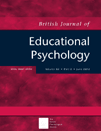
BRITISH JOURNAL OF EDUCATIONAL PSYCHOLOGY
Scope & Guideline
Innovative findings shaping the future of learning.
Introduction
Aims and Scopes
- Research on Learning Processes:
Investigates the cognitive, emotional, and social processes that underpin learning, including how students engage with content and the factors that influence their motivation and achievement. - Intervention Studies:
Focuses on the development and evaluation of interventions designed to enhance educational outcomes, such as resilience-building programs, instructional strategies, and mental health supports. - Diversity and Inclusion:
Explores educational practices that support diverse learners, including those with special educational needs and disabilities, immigrants, and students from various cultural backgrounds. - Teacher-Student Dynamics:
Examines the relationships between teachers and students, including the impact of teacher behavior on student engagement, achievement, and emotional well-being. - Assessment and Measurement:
Contributes to the development of tools and methodologies for assessing educational outcomes, including academic achievement, social-emotional learning, and psychological constructs. - Impact of External Factors:
Considers how external factors such as socioeconomic status, family dynamics, and school climate affect student learning and development.
Trending and Emerging
- Mental Health and Well-being in Education:
A growing body of research focuses on the mental health of students and teachers, exploring how psychological well-being impacts learning and educational outcomes. - Technology in Education:
The integration of technology into educational practices has gained traction, with studies examining the effects of digital tools on learning processes and student engagement. - Resilience and Coping Strategies:
There is an increasing emphasis on understanding resilience in students, particularly in the context of challenges such as the COVID-19 pandemic, and how coping strategies can be fostered in educational settings. - Social-Emotional Learning (SEL):
Research on SEL is on the rise, highlighting the importance of emotional intelligence, self-regulation, and interpersonal skills in fostering academic success and overall well-being. - Culturally Responsive Teaching:
An emerging focus on culturally responsive pedagogies reflects the need to address diverse student backgrounds and create inclusive learning environments. - Data-Driven Decision Making:
The use of data analytics and machine learning to inform educational practices and interventions is becoming increasingly prominent, highlighting the role of evidence-based approaches in education.
Declining or Waning
- Traditional Theories of Learning:
There has been a noticeable decrease in publications focusing on classical learning theories without integration into contemporary educational practices or empirical validation. - Generalized Assessment Strategies:
The focus on broad, non-specific assessment methods has waned, with a shift towards more nuanced and context-specific approaches that consider individual differences and diverse learning environments. - Behaviorism in Educational Psychology:
Research rooted solely in behaviorist principles appears to be declining, as the field increasingly embraces cognitive, emotional, and social perspectives on learning. - One-size-fits-all Interventions:
There is less emphasis on generic intervention strategies, as the journal moves towards more tailored approaches that consider the unique needs of different student populations. - Static Models of Teacher Effectiveness:
Research examining teacher effectiveness through static models is becoming less common, as the field recognizes the dynamic nature of teaching and learning relationships.
Similar Journals

International Journal of School & Educational Psychology
Unveiling New Perspectives in School and Educational PsychologyThe International Journal of School & Educational Psychology, published by Taylor & Francis Ltd, is a premier academic journal dedicated to advancing the fields of educational and developmental psychology. With an ISSN of 2168-3603 and E-ISSN 2168-3611, the journal has been a valuable resource since its establishment in 2013, with contributions to the field continuing through 2024. The journal's commitment to rigorous research is evident in its Q2 ranking in both Developmental and Educational Psychology and Education categories in 2023, as well as its notable Scopus rankings, placing it in the top 25% of educational journals. Although it does not offer open access options, the journal provides an essential platform for disseminating high-quality research that enriches the understanding of psychological principles in educational contexts. Targeting researchers, professionals, and students alike, the International Journal of School & Educational Psychology strives to highlight innovative methodologies, practical applications, and theoretical discussions that shape educational practices and foster optimal learning environments.
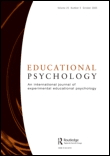
Educational Psychology
Elevating educational standards through psychological understanding.Educational Psychology is a leading peer-reviewed journal published by Routledge Journals, Taylor & Francis Ltd, dedicated to advancing the field of educational and developmental psychology. With its ISSN 0144-3410 and E-ISSN 1469-5820, this esteemed journal provides a platform for innovative research and critical discussions that explore the psychological aspects of learning processes, educational interventions, and cognitive development. Recognized for its quality, it holds an impressive Q1 category ranking in various fields, including Developmental and Educational Psychology, and is ranked in the top 10% of its category in Social Sciences Education and Experimental Psychology according to Scopus Metrics. Spanning from 1981 to 2024, the journal not only publishes rigorous empirical studies but also theoretical articles that contribute significantly to the understanding of educational practices globally. Researchers, educators, and students alike will find this journal an invaluable resource for cutting-edge developments in the intersection of psychology and education, enhancing their academic pursuits and professional growth.

Psicologia Educativa
Bridging Theory and Practice in Educational PsychologyPsicologia Educativa is a renowned academic journal dedicated to the field of educational psychology, published by the COLEGIO OFICIAL PSICOLOGOS MADRID. Since its initiation in 1995, this open access journal has become a significant platform for researchers and practitioners who seek to advance the scientific understanding of psychological principles in educational settings. With an impressive impact factor and recognition within the academic community—ranking in the Q3 quartile for Developmental and Educational Psychology and Q2 for Social Psychology in 2023—Psicologia Educativa is well-positioned to publish influential research that informs educational practices. The journal's scope spans a variety of topics within educational psychology, facilitating critical dialogue and innovative approaches in the realm of social interaction and development learning processes. By providing wide access to scholarly articles, it serves as an essential resource for students, researchers, and education professionals eager to contribute to the ever-evolving field of psychology.
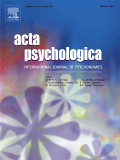
ACTA PSYCHOLOGICA
Fostering collaboration and innovation in psychology.ACTA PSYCHOLOGICA, published by Elsevier, is a leading journal that has served the field of psychology since its inception in 1936. With an impact factor that reflects its authority and significance in the discipline, this journal has become essential for researchers, professionals, and students alike. Open Access since 2021, ACTA PSYCHOLOGICA ensures that groundbreaking psychological research is widely accessible, promoting the dissemination and application of knowledge across various branches of psychology including Developmental and Educational Psychology and Experimental and Cognitive Psychology. The journal is categorized in the Q1 and Q2 quartiles, highlighting its high-quality contributions to the field, supported by robust rankings within Scopus. Located in Amsterdam, Netherlands, this journal remains a vital resource for advancing psychological science and fostering collaborative research worldwide.

International Journal of Educational Psychology
Exploring Innovative Paths in Educational PsychologyInternational Journal of Educational Psychology, published by HIPATIA PRESS, is a premier platform for innovative research in the fields of educational and developmental psychology. With an impact factor reflecting a growing presence in the academic community, this Open Access journal has been delivering peer-reviewed studies since its inception in 2012, facilitating worldwide accessibility and collaboration. Based in Barcelona, Spain, this journal focuses on advancing knowledge and practice in educational psychology, providing insights for educators, researchers, and practitioners alike. As it converges through the years from 2018 to 2024, the journal proudly holds a Q3 quartile ranking in both Developmental and Educational Psychology and Education categories, highlighting its dedication to impactful scholarship. By engaging with the latest findings and fostering critical discussions, the International Journal of Educational Psychology aims to enhance educational practices and inform policy making, thus shaping the future of psychology and education.

Revista de Psicodidactica
Unveiling the Science of Learning and DevelopmentRevista de Psicodidactica, published by ELSEVIER ESPAÑA, is a leading academic journal dedicated to the fields of Developmental and Educational Psychology. With an impressive impact factor reflecting its high-quality research, the journal has achieved a commendable Q2 ranking in its field for Developmental and Educational Psychology and a Q1 ranking in Education as of 2023. Notably, it holds a significant position in Scopus Ranks, placing in the top 90th percentile in Social Sciences Education and the 84th percentile in Psychology. Launched in 2005, the journal is committed to advancing knowledge in educational practices through empirical research and theoretical frameworks. It provides a vital platform for researchers, educators, and students in Spain and beyond, fostering an open exchange of ideas and innovative approaches to learning and development. Though it is not an open-access publication, it remains a compelling source of contemporary findings for those invested in enhancing educational outcomes.
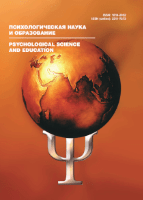
Psikhologicheskaya Nauka i Obrazovanie-Psychological Science and Education
Empowering research to transform education and psychology.Psikhologicheskaya Nauka i Obrazovanie-Psychological Science and Education is a prominent open-access journal published by Moscow State University of Psychology and Education, dedicated to advancing the fields of psychology and education since its inception in 1999. With a keen focus on developmental and educational psychology, this journal has established itself within the academic community, currently ranking in the Q3 quartile across several categories, including Education and Social Psychology. As a resource for researchers, professionals, and students, it provides a platform for innovative research and discussion, contributing to the ongoing dialogue in these critical fields. The journal not only promotes accessibility by being open access since 2015 but also fosters a rich exchange of knowledge pertinent to the Russian context and beyond. With its address located in the heart of Moscow, the journal serves as a significant conduit for scholarly contributions in psychology and education, aiming to enhance understanding and collaboration internationally.

Journal of Educational Cultural and Psychological Studies
Exploring the Nexus of Education, Culture, and PsychologyJournal of Educational Cultural and Psychological Studies is a prominent academic journal published by EDIZIONI UNIV LETTERE ECONOMIA DIRITTO-LED, dedicated to exploring the intricate interplay between education, culture, and psychological processes. Since its inception as an Open Access journal in 2010, it has been committed to disseminating high-quality research that contributes to the fields of Developmental and Educational Psychology, Education, and Social Psychology, achieving Quartile 4 rankings in these categories as of 2023. With an ISSN of 2037-7932 and E-ISSN 2037-7924, the journal operates from Milan, Italy, providing a platform for researchers, professionals, and students to engage with innovative theories and empirical findings. Although the journal currently ranks within the lower percentiles in Scopus metrics, it holds significant potential for growth and influence in the academic landscape, particularly in the rapidly evolving domains it covers. Scholars can access the journal’s articles freely to foster a broader understanding of topics critical to cultural and psychological education, making it an essential resource for anyone interested in advancing their knowledge and research in these interdisciplinary areas.
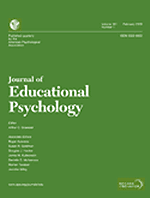
JOURNAL OF EDUCATIONAL PSYCHOLOGY
Shaping Educational Practices with Groundbreaking ResearchJOURNAL OF EDUCATIONAL PSYCHOLOGY, published by the American Psychological Association, stands as a crucial resource in the fields of developmental and educational psychology. With an impressive impact factor that secures its position in the Q1 quartile of both developmental and educational psychology categories, this journal caters to a diverse audience comprising researchers, educators, and policy-makers. Since its inception in 1910, it has consistently provided groundbreaking research and insights that shape educational practices and psychological theories. The journal’s Scopus rankings reflect its significant influence, being positioned within the top 2% of journals in social sciences education and the top 4% in developmental psychology. Although the journal does not offer open access, its rigorous peer-review process ensures the publication of high-quality articles that advance the understanding of learning processes and educational methodologies. Researchers and practitioners alike will find invaluable contributions that inform and transform the educational landscape.

PSYCHOLOGIE IN ERZIEHUNG UND UNTERRICHT
Transforming education with innovative psychological research.PSYCHOLOGIE IN ERZIEHUNG UND UNTERRICHT, published by ERNST REINHARDT GMBH CO VERLAG, serves as a pivotal platform for research in the fields of Developmental and Educational Psychology. Since its inception, this esteemed journal has focused on disseminating groundbreaking insights and innovative practices from 1996 to the present, with expectations to continue through 2024. Despite its current ranking of Q4 in category quartiles and a Scopus rank of #309 out of 360, the journal remains a crucial resource for scholars, educators, and practitioners seeking to enhance their understanding of psychological principles within educational contexts. Situated in the vibrant academic landscape of Germany, the journal emphasizes both theoretical and practical perspectives, motivating interdisciplinary discussions that are vital in addressing contemporary challenges in education and human development. As the journal continues to evolve, it invites contributions that explore emerging trends, providing a rich source of information for both researchers and professionals dedicated to improving educational outcomes through psychological insights.